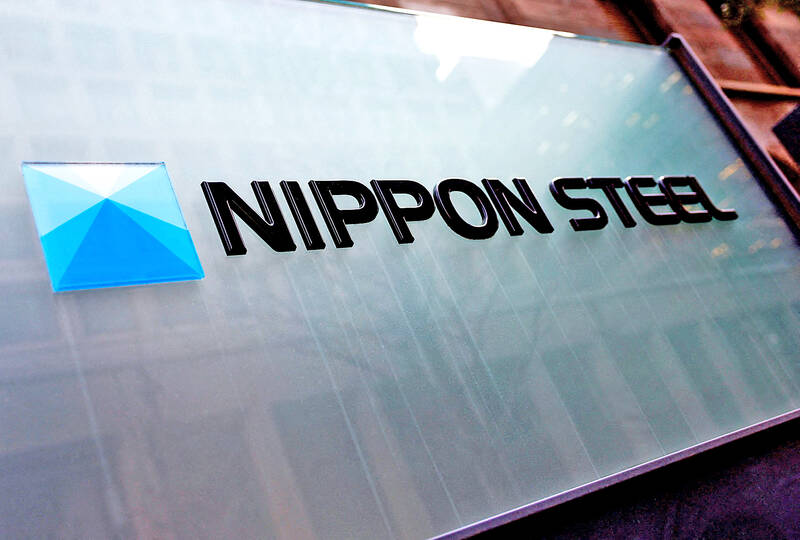Turkey imposed anti-dumping duties on some steel imports from China, Russia, India and Japan, an Official Gazette announcement said yesterday, with the highest tariffs on Chinese imports, boosting stocks of flat steel producers.
The duties affect some 4 million tonnes of imports with a value of some US$2 to US$2.2 billion, Turkish Steel Producers Association (TCUD) secretary general Veysel Yayan said.
The duties range from 6.10 percent to 43.31 percent of cost, insurance and freight prices in a move aimed at preventing unfair competition after appeals by domestic producers, the announcement said.

Photo: Reuters
Ankara’s decision comes amid rising trade tensions between China and the EU over tariffs on electric vehicles, brandy and other goods, and follows China’s complaint to the World Trade Organisation on import duties imposed on Chinese electric vehicles entering Turkey.
An investigation into hot rolled steel imports following domestic producers’ appeals showed that the alleged dumping of steel threatened to damage domestic production, said the Official Gazette, a state journal that publishes new legislation and other announcements.
Shares of Turkish steel producer Erdemir rose as much as 2.48 percent after the announcement, trading up 2.11 percent at noon local time. Isdemir was up 2.2 percent.
“We view this development as positive for hot-rolled flat steel producers, particularly Isdemir and Erdemir,” brokerage Deniz Yatirim said in a note, adding that it could have a supportive effect on sentiment for stocks in other sectors.
TCUD’s Yayan said he expected the capacity utilization rates of domestic producers to increase after the imposition of the anti-dumping duty on hot-rolled flat steel imports.
Duties imposed on imports from China range from around 15 percent to 43 percent, and tariffs imposed on imports from Russia, India and Japan range from 6 percent to 9 percent, according to the decision.

Nvidia Corp chief executive officer Jensen Huang (黃仁勳) on Monday introduced the company’s latest supercomputer platform, featuring six new chips made by Taiwan Semiconductor Manufacturing Co (TSMC, 台積電), saying that it is now “in full production.” “If Vera Rubin is going to be in time for this year, it must be in production by now, and so, today I can tell you that Vera Rubin is in full production,” Huang said during his keynote speech at CES in Las Vegas. The rollout of six concurrent chips for Vera Rubin — the company’s next-generation artificial intelligence (AI) computing platform — marks a strategic

Shares in Taiwan closed at a new high yesterday, the first trading day of the new year, as contract chipmaker Taiwan Semiconductor Manufacturing Co (TSMC, 台積電) continued to break records amid an artificial intelligence (AI) boom, dealers said. The TAIEX closed up 386.21 points, or 1.33 percent, at 29,349.81, with turnover totaling NT$648.844 billion (US$20.65 billion). “Judging from a stronger Taiwan dollar against the US dollar, I think foreign institutional investors returned from the holidays and brought funds into the local market,” Concord Securities Co (康和證券) analyst Kerry Huang (黃志祺) said. “Foreign investors just rebuilt their positions with TSMC as their top target,

REVENUE PERFORMANCE: Cloud and network products, and electronic components saw strong increases, while smart consumer electronics and computing products fell Hon Hai Precision Industry Co (鴻海精密) yesterday posted 26.51 percent quarterly growth in revenue for last quarter to NT$2.6 trillion (US$82.44 billion), the strongest on record for the period and above expectations, but the company forecast a slight revenue dip this quarter due to seasonal factors. On an annual basis, revenue last quarter grew 22.07 percent, the company said. Analysts on average estimated about NT$2.4 trillion increase. Hon Hai, which assembles servers for Nvidia Corp and iPhones for Apple Inc, is expanding its capacity in the US, adding artificial intelligence (AI) server production in Wisconsin and Texas, where it operates established campuses. This

US President Donald Trump on Friday blocked US photonics firm HieFo Corp’s US$3 million acquisition of assets in New Jersey-based aerospace and defense specialist Emcore Corp, citing national security and China-related concerns. In an order released by the White House, Trump said HieFo was “controlled by a citizen of the People’s Republic of China” and that its 2024 acquisition of Emcore’s businesses led the US president to believe that it might “take action that threatens to impair the national security of the United States.” The order did not name the person or detail Trump’s concerns. “The Transaction is hereby prohibited,”